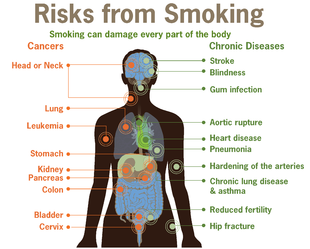Hidden Killing Weapons in Attractive Packaging
The Dangers of Cigarettes to Health: A Threat That Should Not Be Ignored
Cigarettes have long been a hot topic of debate in various parts of the world. Most people are aware of the dangers contained in it, but there are still many who are trapped in the habit of smoking. In fact, scientific evidence has revealed the very serious negative impact of tobacco consumption on Human Health. This article will explain in depth the dangers of smoking for health, as well as the consequences that smokers must bear.
A Brief History and Spread of the Habit of Smoking.
The practice of smoking has existed since ancient times. Tobacco plants have been used by various civilizations for various purposes, both ritual, medical and recreational. However, in the 19th century, the tobacco industry began to develop rapidly with the invention of the tobacco rolling machine, which made mass production of cigarettes possible. Since then, cigarettes have become a common consumer product throughout the world.
Composition of Cigarettes and Their Dangers to Health.
Cigarettes contain more than 7,000 different chemicals. Among these ingredients, at least 250 are known to be harmful, and more than 60 of them are known to cause cancer. Some of the toxic substances contained in cigarettes include:
Nicotine: An addictive substance that causes physical and psychological dependence.
Tar: A mixture of various toxic chemicals that forms when tobacco burns.
Carbon dioxide: A poisonous gas that interferes with the flow of oxygen into the blood.
Ammonia: A chemical that increases dependence on nicotine.
Benzene: A carcinogenic substance proven to cause leukemia.

Impact of Smoking on Health.
The smoking habit has been proven to cause various serious illnesses and even death. The following are some of the negative impacts of smoking on health:
- Heart and Blood Vessel Disease.
Smoking is a major risk factor for coronary heart disease, stroke, and other blood vessel diseases. The nicotine in cigarettes increases blood pressure and causes plaque to build up on artery walls, which can lead to blockages and ultimately heart attacks or strokes. - Cancer.
Cigarettes are the main cause of various types of cancer, including lung, throat, mouth, esophagus, stomach and bladder cancer. Carcinogenic substances in cigarette smoke damage the DNA in body cells, causing the growth of malignant cells. - Respiratory Disorders.
Smoking can cause respiratory problems such as chronic bronchitis, emphysema, and chronic obstructive pulmonary disease (COPD). Cigarette smoke irritates the respiratory tract, causing inflammation and mucus buildup, which narrows the airways and makes breathing difficult. - Reproductive Health Problems.
Smoking can cause various reproductive health problems in both men and women. In men, smoking can cause erectile dysfunction and decreased sperm quality. Meanwhile, in women, smoking can increase the risk of infertility, miscarriage and complications during pregnancy. - Infectious Diseases.
Smokers are also susceptible to infections because smoking weakens the immune system. They are more susceptible to upper and lower respiratory tract infections, lung infections such as pneumonia, and other infectious diseases.
Social and Economic Consequences.
In addition to its direct impact on individual health, smoking also has serious social and economic consequences. The costs of treating diseases caused by smoking are very high, both for individuals and the country’s health system. Apart from that, smoking can also affect work productivity and overall quality of life.
Steps to Quit Smoking.
Although difficult, quitting smoking is the best step you can take to maintain your health and well-being. Here are some steps that can help you to quit smoking:
- Seek Support: Seek support from family, friends, or a support group to help you through the process of quitting smoking.
- Use Nicotine Replacements: Nicotine replacement products such as gum, nicotine patches, or nicotine replacement therapy can help reduce the desire to smoke.
- Avoid Triggers: Identify situations or habits that trigger the desire to smoke, and avoid them if possible.
- Find Replacement Activities: Find replacement activities that can distract you from the urge to smoke, such as exercise, meditation, or a new hobby.
Conclusion.
The dangers of smoking for health cannot be underestimated. Smoking can cause various serious and potentially life-threatening diseases. Therefore, it is very important for individuals to be aware of the risks of smoking and take steps to quit smoking. Apart from that, education and advocacy.



